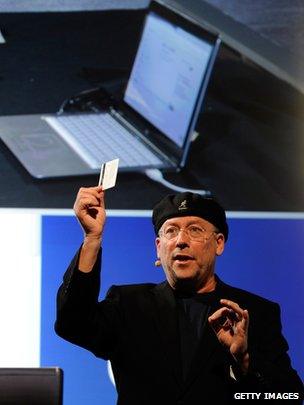CES 2012: Intel demos gesture-control ultrabook range
- Published

Intel vice president Mooly Eden demoed what can be made possible with touchless technology
Intel has shown off gesture-controlled ultrabooks with built-in tilt sensors and touch-free credit card readers.
The chip maker said more than 75 laptop models - with less advanced features - are in the pipeline this year.
The US firm told a Consumer Electronics Show press conference that it planned to launch its biggest marketing campaign in nearly a decade to back the format, starting in April.
The move may help the firm offset slowing desktop PC sales.
Mooly Eden, the vice president and general manager of Intel's PC group, dedicated most of his presentation to the user-experience that ultrabooks offer, giving only brief mention to the technology behind its upcoming Ivy Bridge and Haswell processors.
He noted that the firm was working with its partners to reduce prices and boost screen sizes - two factors that he said had put off shoppers to date.
"People want their device to be nice, small, sleek, sexy... they want to be proud of it," he said.
"There's nothing wrong with loving your computer if it's a great computer."
Mr Eden stressed that the second wave of ultrabooks will be more powerful than the first, showing off game demos and rapidly created photo albums.
Credit card features
However, the announcement of a new identity protection and anti-theft programme offered a clearer vision of innovation.
Mr Eden said near field communication technology would allow online shoppers the option of swiping their credit card over their ultrabooks rather than having to type in their details to make a purchase.
He said the devices could be paired to specific credit cards so that a thief could not activate the process using a stolen card with a different device.
Mr Eden also predicted that most ultrabooks would ship with touchscreens - and further down the line with sensors allowing them to be controlled by touch-free gestures or by tilting the machine.
A flight simulator and gesture-controlled slingshot game were used to show off the proposals.
Intel also unveiled a "strategic alliance" with Nuance - the speech recognition firm that help powers Apple's Siri smartphone assistant.
Intel said more than 75 models will feature their touchless technology
"For the first time you will have a great performance without having to have a headset," said Peter Mahoney, chief marketing officer and general manager of Nuance's Dragon software.
"Unlike other systems it doesn't have to go to the cloud. It will all happen on the ultrabook so you will get great performance."
He also hinted at the prospect of laptops offering live translation - but added that such processor-intensive activity was still some way off.
To promote ultrabook technology Intel has pledged to run its biggest marketing effort since 2003's Centrino campaign which promoted wireless internet.
The announcement comes at a time when desktop PC sales - the former mainstay of Intel's business - are declining.
A study presented by event organiser, the Consumer Electronics Association, suggested that global revenue fell by 2% in 2011.
Intel has also failed to benefit from the rapid rise of smartphones and tablet computers - to date the majority of the devices have been powered by chips designed by the British firm Arm Holdings.
Intel may announced efforts to capture part of this market when its chief executive Paul Otellini delivers his keynote on Tuesday.
- Published8 March 2012
- Published8 March 2012